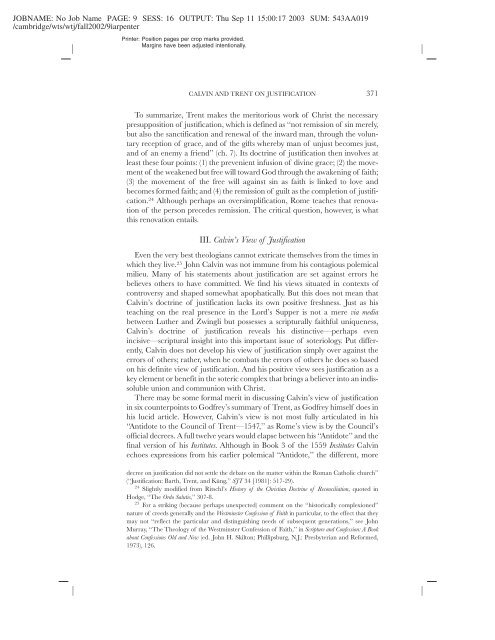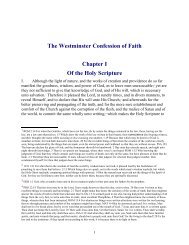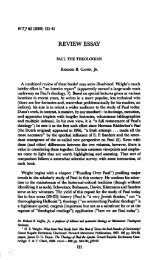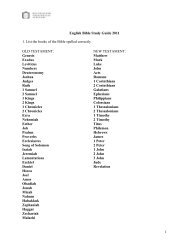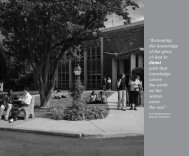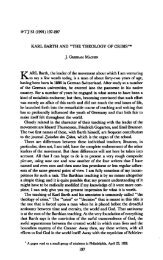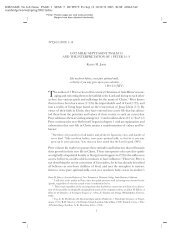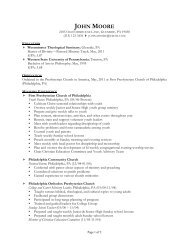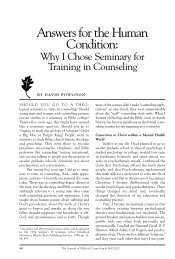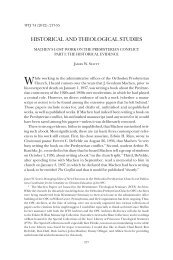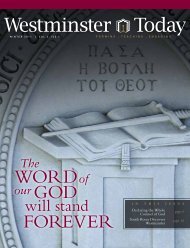A Question of Union with Christ? Calvin and Trent on Justification
A Question of Union with Christ? Calvin and Trent on Justification
A Question of Union with Christ? Calvin and Trent on Justification
Create successful ePaper yourself
Turn your PDF publications into a flip-book with our unique Google optimized e-Paper software.
JOBNAME: No Job Name PAGE: 9 SESS: 16 OUTPUT: Thu Sep 11 15:00:17 2003 SUM: 543AA019<br />
/cambridge/wts/wtj/fall2002/9ìarpenter<br />
Printer: Positi<strong>on</strong> pages per crop marks provided.<br />
Margins have been adjusted intenti<strong>on</strong>ally.<br />
CALVIN AND TRENT ON JUSTIFICATION 371<br />
To summarize, <str<strong>on</strong>g>Trent</str<strong>on</strong>g> makes the meritorious work <str<strong>on</strong>g>of</str<strong>on</strong>g> <str<strong>on</strong>g>Christ</str<strong>on</strong>g> the necessary<br />
presuppositi<strong>on</strong> <str<strong>on</strong>g>of</str<strong>on</strong>g> justificati<strong>on</strong>, which is defined as ‘‘not remissi<strong>on</strong> <str<strong>on</strong>g>of</str<strong>on</strong>g> sin merely,<br />
but also the sanctificati<strong>on</strong> <str<strong>on</strong>g>and</str<strong>on</strong>g> renewal <str<strong>on</strong>g>of</str<strong>on</strong>g> the inward man, through the voluntary<br />
recepti<strong>on</strong> <str<strong>on</strong>g>of</str<strong>on</strong>g> grace, <str<strong>on</strong>g>and</str<strong>on</strong>g> <str<strong>on</strong>g>of</str<strong>on</strong>g> the gifts whereby man <str<strong>on</strong>g>of</str<strong>on</strong>g> unjust becomes just,<br />
<str<strong>on</strong>g>and</str<strong>on</strong>g> <str<strong>on</strong>g>of</str<strong>on</strong>g> an enemy a friend’’ (ch. 7). Its doctrine <str<strong>on</strong>g>of</str<strong>on</strong>g> justificati<strong>on</strong> then involves at<br />
least these four points: (1) the prevenient infusi<strong>on</strong> <str<strong>on</strong>g>of</str<strong>on</strong>g> divine grace; (2) the movement<br />
<str<strong>on</strong>g>of</str<strong>on</strong>g> the weakened but free will toward God through the awakening <str<strong>on</strong>g>of</str<strong>on</strong>g> faith;<br />
(3) the movement <str<strong>on</strong>g>of</str<strong>on</strong>g> the free will against sin as faith is linked to love <str<strong>on</strong>g>and</str<strong>on</strong>g><br />
becomes formed faith; <str<strong>on</strong>g>and</str<strong>on</strong>g> (4) the remissi<strong>on</strong> <str<strong>on</strong>g>of</str<strong>on</strong>g> guilt as the completi<strong>on</strong> <str<strong>on</strong>g>of</str<strong>on</strong>g> justificati<strong>on</strong>.<br />
24 Although perhaps an oversimplificati<strong>on</strong>, Rome teaches that renovati<strong>on</strong><br />
<str<strong>on</strong>g>of</str<strong>on</strong>g> the pers<strong>on</strong> precedes remissi<strong>on</strong>. The critical questi<strong>on</strong>, however, is what<br />
this renovati<strong>on</strong> entails.<br />
III. <str<strong>on</strong>g>Calvin</str<strong>on</strong>g>’s View <str<strong>on</strong>g>of</str<strong>on</strong>g> Justificati<strong>on</strong><br />
Even the very best theologians cannot extricate themselves from the times in<br />
which they live. 25 John <str<strong>on</strong>g>Calvin</str<strong>on</strong>g> was not immune from his c<strong>on</strong>tagious polemical<br />
milieu. Many <str<strong>on</strong>g>of</str<strong>on</strong>g> his statements about justificati<strong>on</strong> are set against errors he<br />
believes others to have committed. We find his views situated in c<strong>on</strong>texts <str<strong>on</strong>g>of</str<strong>on</strong>g><br />
c<strong>on</strong>troversy <str<strong>on</strong>g>and</str<strong>on</strong>g> shaped somewhat apophatically. But this does not mean that<br />
<str<strong>on</strong>g>Calvin</str<strong>on</strong>g>’s doctrine <str<strong>on</strong>g>of</str<strong>on</strong>g> justificati<strong>on</strong> lacks its own positive freshness. Just as his<br />
teaching <strong>on</strong> the real presence in the Lord’s Supper is not a mere via media<br />
between Luther <str<strong>on</strong>g>and</str<strong>on</strong>g> Zwingli but possesses a scripturally faithful uniqueness,<br />
<str<strong>on</strong>g>Calvin</str<strong>on</strong>g>’s doctrine <str<strong>on</strong>g>of</str<strong>on</strong>g> justificati<strong>on</strong> reveals his distinctive—perhaps even<br />
incisive—scriptural insight into this important issue <str<strong>on</strong>g>of</str<strong>on</strong>g> soteriology. Put differently,<br />
<str<strong>on</strong>g>Calvin</str<strong>on</strong>g> does not develop his view <str<strong>on</strong>g>of</str<strong>on</strong>g> justificati<strong>on</strong> simply over against the<br />
errors <str<strong>on</strong>g>of</str<strong>on</strong>g> others; rather, when he combats the errors <str<strong>on</strong>g>of</str<strong>on</strong>g> others he does so based<br />
<strong>on</strong> his definite view <str<strong>on</strong>g>of</str<strong>on</strong>g> justificati<strong>on</strong>. And his positive view sees justificati<strong>on</strong> as a<br />
key element or benefit in the soteric complex that brings a believer into an indissoluble<br />
uni<strong>on</strong> <str<strong>on</strong>g>and</str<strong>on</strong>g> communi<strong>on</strong> <str<strong>on</strong>g>with</str<strong>on</strong>g> <str<strong>on</strong>g>Christ</str<strong>on</strong>g>.<br />
There may be some formal merit in discussing <str<strong>on</strong>g>Calvin</str<strong>on</strong>g>’s view <str<strong>on</strong>g>of</str<strong>on</strong>g> justificati<strong>on</strong><br />
in six counterpoints to Godfrey’s summary <str<strong>on</strong>g>of</str<strong>on</strong>g> <str<strong>on</strong>g>Trent</str<strong>on</strong>g>, as Godfrey himself does in<br />
his lucid article. However, <str<strong>on</strong>g>Calvin</str<strong>on</strong>g>’s view is not most fully articulated in his<br />
‘‘Antidote to the Council <str<strong>on</strong>g>of</str<strong>on</strong>g> <str<strong>on</strong>g>Trent</str<strong>on</strong>g>—1547,’’ as Rome’s view is by the Council’s<br />
<str<strong>on</strong>g>of</str<strong>on</strong>g>ficial decrees. A full twelve years would elapse between his ‘‘Antidote’’ <str<strong>on</strong>g>and</str<strong>on</strong>g> the<br />
final versi<strong>on</strong> <str<strong>on</strong>g>of</str<strong>on</strong>g> his Institutes. Although in Book 3 <str<strong>on</strong>g>of</str<strong>on</strong>g> the 1559 Institutes <str<strong>on</strong>g>Calvin</str<strong>on</strong>g><br />
echoes expressi<strong>on</strong>s from his earlier polemical ‘‘Antidote,’’ the different, more<br />
decree <strong>on</strong> justificati<strong>on</strong> did not settle the debate <strong>on</strong> the matter <str<strong>on</strong>g>with</str<strong>on</strong>g>in the Roman Catholic church’’<br />
(‘‘Justificati<strong>on</strong>: Barth, <str<strong>on</strong>g>Trent</str<strong>on</strong>g>, <str<strong>on</strong>g>and</str<strong>on</strong>g> Küng,’’ SJT 34 [1981]: 517-29).<br />
24 Slightly modified from Ritschl’s History <str<strong>on</strong>g>of</str<strong>on</strong>g> the <str<strong>on</strong>g>Christ</str<strong>on</strong>g>ian Doctrine <str<strong>on</strong>g>of</str<strong>on</strong>g> Rec<strong>on</strong>ciliati<strong>on</strong>, quoted in<br />
Hodge, ‘‘The Ordo Salutis,’’ 307-8.<br />
25 For a striking (because perhaps unexpected) comment <strong>on</strong> the ‘‘historically complexi<strong>on</strong>ed’’<br />
nature <str<strong>on</strong>g>of</str<strong>on</strong>g> creeds generally <str<strong>on</strong>g>and</str<strong>on</strong>g> the Westminster C<strong>on</strong>fessi<strong>on</strong> <str<strong>on</strong>g>of</str<strong>on</strong>g> Faith in particular, to the effect that they<br />
may not ‘‘reflect the particular <str<strong>on</strong>g>and</str<strong>on</strong>g> distinguishing needs <str<strong>on</strong>g>of</str<strong>on</strong>g> subsequent generati<strong>on</strong>s,’’ see John<br />
Murray, ‘‘The Theology <str<strong>on</strong>g>of</str<strong>on</strong>g> the Westminster C<strong>on</strong>fessi<strong>on</strong> <str<strong>on</strong>g>of</str<strong>on</strong>g> Faith,’’ in Scripture <str<strong>on</strong>g>and</str<strong>on</strong>g> C<strong>on</strong>fessi<strong>on</strong>: A Book<br />
about C<strong>on</strong>fessi<strong>on</strong>s Old <str<strong>on</strong>g>and</str<strong>on</strong>g> New (ed. John H. Skilt<strong>on</strong>; Phillipsburg, N.J.: Presbyterian <str<strong>on</strong>g>and</str<strong>on</strong>g> Reformed,<br />
1973), 126.


